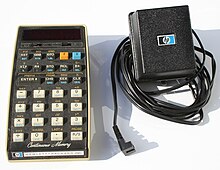HP-19C/-29C


The HP-19C and HP-29C were scientific/engineering pocket calculators made by Hewlett-Packard between 1977 and 1979. They were the most advanced and last models of the "20" family (compare HP-25) and included Continuous Memory (battery-backed CMOS memory) as a standard feature.
The HP-19C included a small thermal printer, one of the very few hand-held scientific calculators to offer such a feature (HP-91, HP-92 and HP-97 were desktop units and later models like the HP-41C only supported external printers). Due to the printer's power requirements, the 19C used a battery pack of four AA-sized NiCd cells, adding to the weight of the calculator and printer mechanism.
All other capabilities were the same in both models – RPN expression logic, 98 program memory locations, statistical functions, and 30 registers.
Users could develop software for the HP-29C/19C, such as a prime number generator.[1] The calculators expanded the HP-25's program capabilities by adding subroutines, increment/decrement looping, relative branching and indirect addressing (via register 0 as index).
HP's internal code name for the 29C was Bonnie, the 19C was correspondingly named Clyde.[citation needed]
The HP-19C and HP-29C were introduced at MSRPs of $345[2] and $195,[3] respectively.
A version adapted to support an additional backward-facing display manufactured by Educational Calculator Devices named EduCALC 29C GD existed as well.[4]
Simulators and emulators
- HP-29C simulator for Windows
- HP-19C and HP-29C emulators for Windows
- HP Calculator emulators for Linux
HP-29C microcode emulator for any platform
HP-29C microcode emulator for Windows
References
- ^ Aslan, Wilfred (1980-10-01). "Prime Numbers on the HP-19C". BYTE. pp. 54–58. Retrieved 2015-12-21.
- ^ $345 in 1980 ≈ $910 in 2010 (see Inflation Conversion Factors for Dollars Archived 2007-12-30 at the Wayback Machine)
- ^ $195 in 1980 ≈ $510 in 2010 (ibid.)
- ^ Augustine, M. (2014-04-25). "Educalc 29C GD - any information for me?". The Museum of HP Calculators. Archived from the original on 2021-02-05. Retrieved 2022-07-01.
